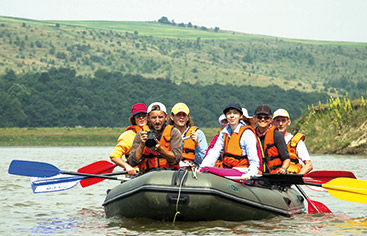Governing water – preventing conflicts: the OSCE promotes water governance

Governing water – preventing conflicts: the OSCE promotes water governance
Challenges and opportunities related to water remain high on the agenda of the Organization for Security and Cooperation in Europe (OSCE), the world’s largest regional security organisation.

In the Dniester River Basin, joint monitoring activities have built confidence among Ukraine and Moldova, including Transnistria/Moldova.
© Ecological Movement of Moldova
For many years, water has been one of the main areas of OSCE engagement, and 2015 will be a special year for water: The Serbian Chairmanship has made it a priority by dedicating this year’s Economic and Environmental Forum – the organisation’s annual three-part event on select economic and environmental issues that can impact security – to water governance.
The OSCE was founded during the cold war in the early 1970s as a negotiating forum between East and West. Today, the organisation comprises 57 countries on three continents: North America, Europe and Asia. Since its beginnings, the OSCE has followed a comprehensive approach to security that embraces three complementary dimensions: the politico-military dimension, the economic and environmental dimension and the human dimension. OSCE activities that link environment and security range from water management and hazardous waste to climate change and sustainable energy.
Water and security. When it comes to water, the entry points for the OSCE are clear: first, water is a strategic resource and an essential element of national and regional security. Second, over 150 rivers and lakes are shared by two or more of the OSCE’s 57 participating states.
One transboundary river that is shared by several countries in the OSCE region is the Danube. Here, as in many other watersheds, the riparian countries – all OSCE participating states – have established joint bodies and long-standing and trustful cooperation. But there are still transboundary basins that lack such agreements, and have insufficient arrangements or no effective implementation mechanism – all of which could potentially lead to disputes.
Supporting water cooperation. The OSCE has a long track record of supporting countries to jointly manage water resources sustainably. The first meeting of the Interim Sava Basin Commission took place at the OSCE premises in Vienna in April 2003, after the the riparian countries signed the Framework Agreement on the Sava River Basin, the first development-oriented multilateral agreement signed after the Dayton Peace Agreement.
Eight years of negotiations facilitated by the OSCE and the United Nations Economic Commission for Europe (UNECE) within the Environment and Security Initiative (ENVSEC) culminated in the signing of the Dniester River Basin Treaty by Ukraine and the Republic of Moldova in 2012. The Dniester River Basin is also a focus area of an OSCE-led ENVSEC project on climate change and security, financed by the Instrument for Stability of the European Commission and the Austrian Development Agency.
Since 2003, the OSCE together with UNECE has also supported the establishment and operation of a bilateral water commission of Kazakhstan and Kyrgyzstan on the Chu and Talas Rivers. Since 2010, the OSCE in collaboration with UNECE has facilitated several rounds of bilateral consultations between Azerbaijan and Georgia for the development of an agreement on the Kura River Basin in the South Caucasus.
In addition to the activities listed above, the OSCE field operations – which are active in Eastern Europe, South-Eastern Europe, the South Caucasus and Central Asia – advance good water governance through training courses on integrated water resources management, giving support to water user associations and river basin councils, and promoting civil society participation.
Researchers, the business community and foreign policy makers are increasingly aware of the risks water crises can pose to security, and the additional stress put on water resources by climate change. Therefore, the Swiss and Serbian OSCE Chairmanships together identified sustainable water management as a priority in their joint 2014-15 work plan. A major event in this context was the Security Day entitled ‘Enhancing security through water diplomacy: the role of the OSCE’ held in Vienna last July by the OSCE Secretary General and the Swiss Chairmanship. The high-level participants emphasised the importance of water diplomacy as a new entry point for foreign policy to foster bilateral and regional cooperation among states.
Looking ahead. The 2015 Forum on water governance (see box) which brings together governments, civil society, international organisations, the private sector and academia, will also look back at disaster risk reduction, the EEF focus of 2014. Clearly, water governance and disaster risk reduction are firmly on the OSCE agenda, linking our work with the ongoing global processes on disaster risk reduction, climate change and the post-2015 sustainable development agenda.
2015 Economic and Environmental Forum
Water governance in the OSCE area – increasing security and stability through cooperation
First preparatory meeting, Vienna, 26-27 January.
Among others, best practices on the advanced mechanisms for cooperation and participation achieved in the Danube Basin were shared by Susanne Brandstetter, Chair of ICPDR’s Public Participation Expert Group, and Dejan Komatina, Secretary of the Sava Commission.
Second preparatory meeting Belgrade, 11-13 May.
Focus on awareness-raising and water governance in the context of disaster risk reduction, with discussions on the regional response to the devastating floods that affected South Eastern Europe in May last year.
Concluding meeting, Prague, 14-16 September.
Interested stakeholders will share experiences in meeting water-related risks to security and fostering good water governance.
For more information, please visit: www.osce.org/eea.





